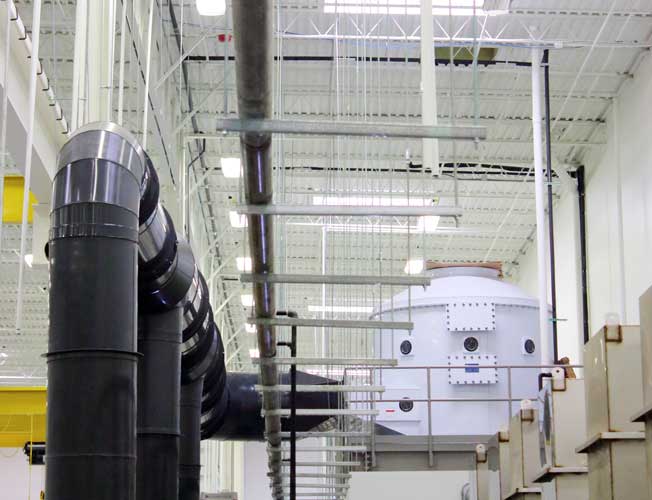
In the industrial sector where metal parts, pipes, and equipment are crucial for the flow of gases and fluids, corrosion presents a formidable threat. This relentless enemy can silently undermine operational efficiency, leading to equipment failures, unplanned downtime, and costly repairs. To maintain operational efficiency and protect profitability, it's essential to understand how chemical and environmental corrosion impacts metal components and invest in effective protective measures.
The Impact of Corrosion on Industrial Equipment
Corrosion occurs when metals deteriorate due to reactions with their environment. In industrial settings, this process is often accelerated by exposure to harsh chemicals, moisture, extreme temperatures, and other environmental factors. Metal parts and equipment that are not adequately protected may suffer from diminished strength, increased wear and tear, and, ultimately, premature failure.
The financial impact of corrosion is considerable. The National Association of Corrosion Engineers (NACE) reports that corrosion costs industries worldwide more than $2.5 trillion annually. These costs encompass direct expenses such as maintenance and repairs and indirect costs like lost productivity and downtime. For businesses reliant on heavy machinery and infrastructure, corrosion represents a significant drain on resources and affects the bottom line.
Applications Vulnerable to Corrosion
Certain industrial applications are particularly prone to corrosion due to their exposure to harsh environmental and chemical conditions. Here are seven examples where corrosion poses a significant risk:
- Oil and Gas Pipelines: Pipelines exposed to constant moisture, chemicals, and fluctuating temperatures are highly susceptible to both internal and external corrosion, leading to leaks and potential environmental hazards.
- Marine Equipment: The corrosive nature of saltwater makes ships, offshore platforms, and other marine structures vulnerable to rapid degradation.
- Chemical Processing Plants: Equipment handling corrosive substances in these plants often experiences chemical reactions that weaken metal components over time.
- Mining Operations: The abrasive and corrosive environment, combined with exposure to moisture and chemicals, accelerates wear and tear on mining equipment.
- Power Generation Facilities: Boilers, turbines, and cooling systems in power plants face high temperatures, humidity, and corrosive chemicals, increasing the risk of corrosion.
- Construction Equipment: Heavy machinery used in construction is frequently exposed to rain, snow, and mud, which can lead to rust and corrosion.
- Agricultural Machinery: Fertilizers, pesticides, and outdoor conditions contribute to the corrosion of metal parts in tractors, plows, and other farm equipment.
The Role of Metal Finishing Treatments
To mitigate the effects of corrosion, many industries turn to metal finishing treatments that provide an extra layer of protection. These treatments, including hard chrome plating, electroless nickel coating, and phosphate-based coatings, are particularly effective in extending the lifespan of metal parts under challenging conditions.
-
Hard Chrome Plating: This process involves applying a layer of chromium to metal parts, creating a durable, corrosion-resistant surface. It is especially beneficial for components exposed to abrasive conditions. For those seeking hard chrome plating near Dallas TX, this treatment offers reliable protection.
-
Electroless Nickel Coating: Unlike traditional nickel plating, which requires an electric current, electroless nickel coating is applied chemically, ensuring even coverage on complex surfaces. This method provides excellent corrosion resistance, making it ideal for components exposed to chemicals and moisture. Businesses looking for a plating service in Dallas often recommend this coating for its superior protection.
-
Phosphate-Based Coating: Phosphate coatings are used as either a pre-treatment for painting or a standalone anti corrosion coating service. This treatment improves the adhesion of subsequent coatings and offers protection against rust and corrosion, making it suitable for parts exposed to outdoor or high-humidity environments.
These metal finishing treatments not only protect against corrosion but also enhance the durability and performance of metal parts, reducing the need for frequent maintenance and replacements. For industries needing metal plating for steel in TX, these treatments are crucial for prolonging the lifespan of critical components.
In industries where the integrity of metal parts and equipment is vital, corrosion remains a significant challenge. However, by understanding the effects of chemical and environmental factors on metal longevity and investing in protective treatments, businesses can prevent corrosion from eroding profits. Whether through hard chrome plating, electroless nickel coating, or phosphate-based coatings, effective anti-corrosion measures are essential for extending the life of metal components and ensuring reliable performance under demanding conditions.
Protecting your investment in industrial equipment is not merely about preserving metal—it's about safeguarding your financial health.
Comments on “Preventing Corrosion From Eating Away at Profits”